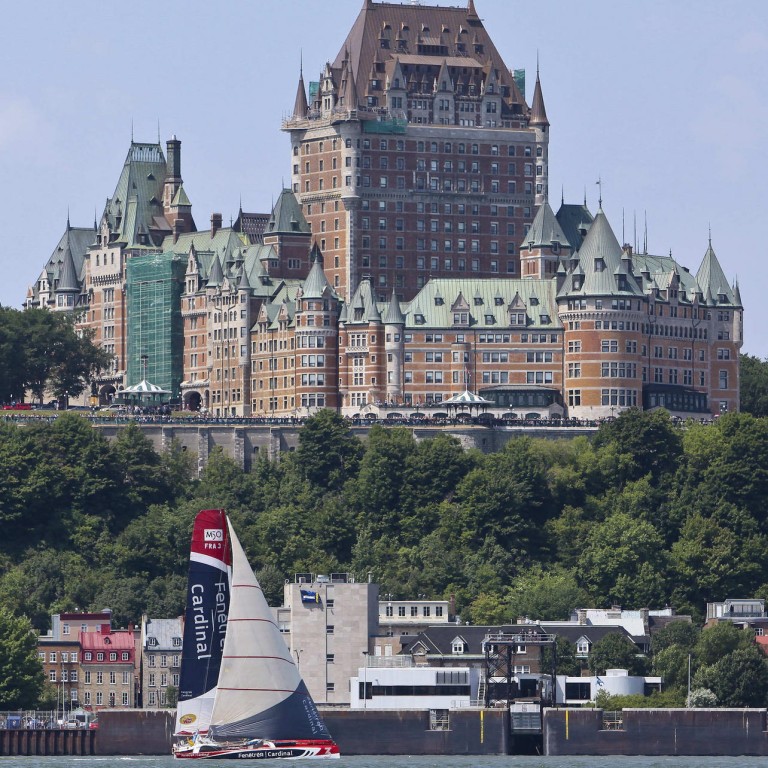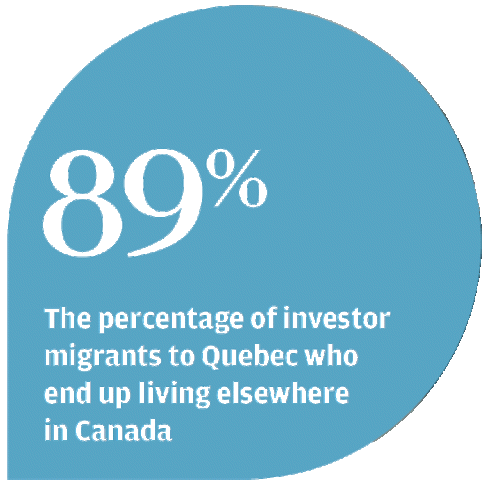
Rich Chinese seek Canadian migration through Quebec province
Millionaires seek investment migration through French-speaking province but then move on; however, they may face an eight-year wait
Thousands of Chinese millionaires are lining up to immigrate to Canada via Quebec, attempting to sidestep the federal government's freeze on its own version of the controversial cash-for-visas scheme, new data has revealed.

The data was obtained by Vancouver immigration lawyer Richard Kurland under a freedom-of-information request, in the wake of Ottawa's decision to halt new applications for the federal investor migrant scheme last year. Quebec's version of the scheme remains open for business.
Kurland said it was unfair of Quebec to continue to accept thousands of applications without warning prospective migrants they faced potential delays of eight years or more. Quebec had effectively sabotaged attempts to reduce the backlog, he said.
"It's like Ottawa has built a submarine, and it's going underwater, but Quebec installed a screen door on it," said Kurland.
Under both versions of the scheme, immigrants with a net worth of at least C$1.6 million (HK$11.7 million) can buy their way into Canada by giving the government an interest-free loan of C$800,000 for a period of five years.
The data obtained by Kurland shows that 2,123 applications lodged in Hong Kong last year have been approved by Quebec, then simply added to the federal backlog in defiance of the federal freeze. This was more than from the rest of the world combined.
Previous admission data suggests that all except a few per cent of applications lodged in Hong Kong are made by mainland Chinese: mainland investor migrants arriving in British Columbia outstripped Hongkongers by about 100 to 1 last year, when mainlanders made up 76 per cent of all such admissions.
Applicants approved by Quebec join a federal backlog that last year stood at more than 85,000. Only 9,359 visas were issued that year, suggesting a long wait if new applicants go to the back of the queue.
In August this year, Quebec introduced a cap on the number of investor visa applications it would accept each year. For 2013, the cap was set at 1,750, with a maximum of 1,200 from any one country.
Quebec has not revealed the number of applications it received via Hong Kong this year, but immigration consultant Mathieu Dumont said the scheme was heavily oversubscribed. Dumont's Hong Kong-based firm, Yelo Consulting, specialises in helping obtain Quebec investor visas for Chinese clients. Dumont said that this year "the Quebec government received maybe 4,800 visa applications [from mainland Chinese], but they only selected 1,200 in an electronic lucky draw."
He agreed that Chinese interest in the Quebec scheme had increased in the past three years. The federal government tightened access to its programme in 2010 before imposing the 2012 freeze.
"Yes, there are more and more [applicants]. There has been a real increase in the total files that are sent through this [Hong Kong] office," said Dumont, who founded Yelo more than three years ago. "It seems that every year since we started we have seen an increase."
But Dumont disputed Kurland's suggestion of eight-year waiting times for applicants. He said the delay was about four years.
Kurland said he was not concerned that Chinese migrants applying via Quebec were exploiting a loophole in the federal freeze; instead, he said, the issue was one of consumer protection.
"How many people would agree to deposit money in Quebec, knowing that it will be eight years before they are issued a visa? They don't know, they are not aware and that's the consumer protection problem," he said.
The data provided by Kurland came in the form of an e-mail between federal immigration staff on March 1 [2013]. It updated the number of applications approved by Quebec that were in the federal backlog of investor migrants, as of January 8 [2013]. Among the 9,252 migrants Quebec had in the backlog, 3,626 were lodged by applicants last year, the year Ottawa stopped accepting new applications.
Neither Citizenship and Immigration Canada nor the Bureau d'Immigration du Québec in Hong Kong responded to requests for comment.
Data also released by Kurland shows that few of Quebec's investor migrants remain there. Of the 18,258 such migrants who renewed Canadian residency from 2000 to 2008, 89 per cent had no address in Quebec.
Canada's Conservative government has been harshly critical of the phenomenon. "If a person fills out Quebec's investor programme form and indicates their intention to reside in Quebec … then goes straight to Vancouver without even going to Quebec, that would be fraud," then-immigration minister Jason Kenney told MPs in June. "It is a crime."
But Dumont said it was perfectly legal for migrants to move. "Once you get your Canadian permanent resident card, you can live wherever you want in Canada," he said.
Sandy Garossino, a civic advocate in Vancouver concerned about the city's high property prices, said there was little evidence that rich migrants created many jobs or economic opportunities. The investor migrant scheme "is great for luxury residential real estate agents and Lamborghini dealers", but not necessarily the wider community, she said.
“I welcome all immigration, but the capital that comes with it has to be put to work creating jobs,” she said.
Wealthy Chinese have previously tried other tactics to get around the federal freeze on the investor migrant scheme. In November last year, British Columbia suspended a fast-track visa scheme after a 120 per cent spike in applications from purported business investors. Most of the suspicious applications were reportedly from China.

